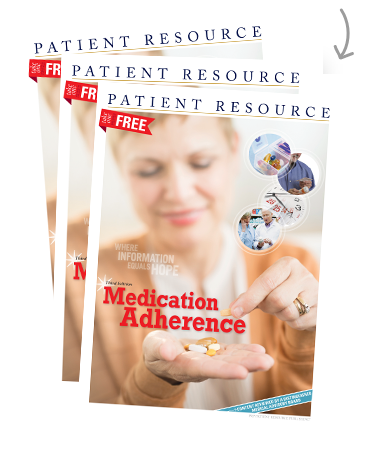Medication Adherence
Adherence easier when these are managed
Unfortunately many cancer treatments may cause side effects, which can cause some patients to alter how they take them. You shouldn’t assume you will experience all of the side effects listed with your regimen, but if you do the good news is that advances have been made in preventing or managing many of them. Managing these effects is important because if you feel better, you’re more likely to complete your treatment as planned by your oncologist.
If you’re encountering side effects from your oral medications, try some of the following tips to lessen their severity, and talk to your doctor about other ways they can be managed. Also reach out to other cancer survivors about their experiences and what helped them find relief. And remember, be careful when reading about other patient experiences on Internet forums and chat boards. Many times, those posting represent the minority of patients; those who experienced no side effects often don’t take the time to post comments.
Fatigue
Several factors may cause cancer-related fatigue, including the cancer itself. Cancer can alter your hormones, weaken your muscles or trigger other changes in your body, which all may lead to fatigue. Various types of treatments may contribute to fatigue, primarily because the body needs extra energy to repair the healthy tissues damaged during treatment.
What to try:
- Participate in regular physical activity, such as walking, yoga or bike riding.
- Ask your doctor about psychostimulant drugs, which help improve your alertness.
- Take frequent rest periods or naps, but limit each nap to 45 minutes.
- Save energy, set priorities about what you can do and delegate duties.
- Eat a well-balanced diet to help promote healing and restore your energy.
Nausea and vomiting
Certain medications damage the lining of the stomach, causing these two very common and uncomfortable side effects for cancer patients.
What to try:
- Ask your doctor about anti-nausea medications that can be taken preventively.
- Stay hydrated by slowly drinking cold, clear liquids (ginger ale, juice or tea).
- Try meditation, deep and controlled breathing or self-hypnosis.
- Eat several small meals or snacks throughout the day instead of three large meals.
- Avoid spicy or fried foods, and try to stay away from unpleasant odors.
- Keep a diary to find connections between certain foods that make you feel sick.
Diarrhea
Loose or watery stools combined with painful stomach cramps and discomfort can be made worse by stress. If this condition isn’t treated, dehydration, loss of important nutrients, weight loss and fatigue are all possible.
What to try:
- Follow a clear-liquid diet to help the lining of your intestines heal.
- Eat bland, low-fiber foods (white rice, bananas, toast, applesauce).
- Avoid fluids and food that can irritate the digestive tract (alcohol, caffeine, dairy, orange juice, prune juice).
- Avoid very hot or cold beverages.
- Eat more frequently in small amounts.
- Try eating foods with probiotics, healthy bacteria found in certain yogurts.
Mouth sores
Small cuts or ulcers may form in the lining of the inside of the mouth and may also affect the gums, tongue, roof of the mouth and lips.
What to try:
- Check your mouth twice each day with a small flashlight and tongue depressor, and clean your mouth and teeth gently with a soft toothbrush or mouth swab.
- Ask about medications that coat the lining of your mouth.
- Keep your mouth and lips moist by using lip balm, sipping water or sucking on ice.
- Eat foods at room temperature.
- Avoid alcoholic beverages; tobacco; and spicy, acidic, greasy, fried or coarse foods.
Skin reactions
Painful or itchy rashes can develop as dry, flaky, red and irritated skin.
What to try:
- Ask your doctor about corticosteroid creams that may help.
- Moisturize at least twice daily with thick cream made for sensitive skin.
- Wear loose-fitting clothes.
- Avoid contact with hot water; opt for lukewarm water instead.
- Use mild soap that does not contain alcohol, perfume or dye.
- Protect skin from the sun by always covering up and/or applying sunscreen.
Peripheral neuropathy
Peripheral neuropathy is a disorder of the nerves that are outside the brain and spinal cord. The symptoms of peripheral neuropathy usually include numbness and tingling, a decreased sensation of hot and cold, unpleasant sensations when touched, muscle weakness and cramping and balance problems.
What to try:
- Ask your doctor about substances to protect against nerve damage.
- Try exercise to ease discomfort and strengthen muscles.
- Ask your doctor about chemoprotective agents that can be given before or with a chemotherapy drug that’s likely to cause peripheral neuropathy.
- Stretch in the morning to decrease pain.
- Move your hands and feet in all directions before you get out of bed.
- Ask your doctor about massage, acupuncture and transcutaneous electrical nerve stimulation (TENS).
- Avoid snug shoes or socks and extreme hot or cold temperatures.
Menopausal symptoms
Natural menopause typically occurs when a woman is between 45 and 55 years old. However, certain types of cancer treatment can cause premature menopause at an earlier age.
What to try:
- For vaginal dryness, try over-the-counter vaginal moisturizers. (Don’t confuse them with vaginal lubricants.)
- For pain during sexual intercourse, try over-the-counter vaginal lubricants.
- Avoid spicy foods and hot beverages if you’re experiencing hot flashes. Wear cotton clothing in layers that absorb moisture and are easy to remove.



